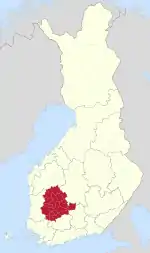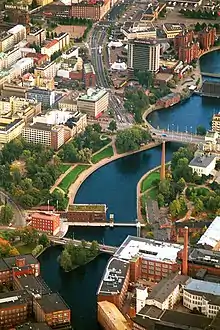Pirkanmaa
Pirkanmaa (Swedish: Birkaland, also known as Tampere Region in government documents;[1] Latin: Birkaria), is a region of Finland. It borders the regions of Satakunta, South Ostrobothnia, Central Finland, Päijät-Häme, Kanta-Häme and Southwest Finland. Most of the water area in the Kokemäki River watershed is located in the Pirkanmaa region, although Lake Vanajavesi is partly in the Kanta-Häme region. The region got its name from Pirkkala, which in the Middle Ages comprised most of present-day Pirkanmaa.[2] Tampere is the regional center and capital of Pirkanmaa, and at the same time the largest city in the region.
Pirkanmaa
Pirkanmaan maakunta landskapet Birkaland | |
|---|---|
 Coat of arms | |
 Pirkanmaa on a map of Finland | |
| Coordinates: 61°42′N 23°43′E | |
| Country | Finland |
| Historical province | Satakunta, Tavastia |
| Capital | Tampere |
| Area | |
| • Total | 14,469.39 km2 (5,586.66 sq mi) |
| Population (2019) | |
| • Total | 517,666 |
| • Density | 36/km2 (93/sq mi) |
| Time zone | UTC+2 (EET) |
| • Summer (DST) | UTC+3 (EEST) |
| ISO 3166 code | FI-11 |
| NUTS | 192 |
| Regional animal | White-tailed deer (Odocoileus albavirginianus) |
| Regional bird | White wagtail (Motacilla alba) |
| Regional fish | Asp (Aspius aspius) |
| Regional flower | Bird cherry (Prunus padus) |
| Regional stone | Orbiculite |
| Regional lake | Lake Längelmävesi |
| Website | pirkanmaa.fi |
The total population of Pirkanmaa was 520,532 on 30 September 2020,[3] which makes it the second largest among Finland's regions after Uusimaa. The population density is well over twice the Finnish average, and most of its population is largely concentrated in the Tampere sub-region.
Economy
The Gross domestic product (GDP) of the region was 18.3 billion € in 2016, accounting for 8.5% of Finnish economic output. GDP per capita adjusted for purchasing power was 36,040 € or 92% of the EU27 average in the same year. Pirkanmaa's GDP was the second highest among the regions and the seventh highest among the nineteen regions per capita.[4]
The economic structure of Pirkanmaa typically focuses on services for post-industrial society. A nationally significant ICT concentration has grown in Tampere. Thanks to its population base, the city is also a major trading center. Industry's share of value added and jobs in Pirkanmaa is higher than the Finnish average. The region is one of Finland's main centers of manufacturing, has a long tradition of industrial activity and a good education network. The industry is largely concentrated in Tampere and its surroundings, such as towns of Nokia and Valkeakoski. Mänttä-Vilppula is also a major industrial center. Agriculture accounts for a small share of economic activity. In the western part of the region, agricultural production is dominated by dairy cattle, in the south by cereals, and in the north by forestry.[5][6][7]
Language
Pirkanmaa is a rather linguistically homogeneous region: in 2018, almost 490,000 people, or about 95 per cent of the county's population, spoke Finnish as their mother tongue. For Finno-speakers, the national population share of Pirkanmaa was 10,1 per cent.[8] In the 2010s, the number of Finnish-speakers has increased only in Uusimaa, Pirkanmaa and Northern Ostrobothnia, and slightly in Southwest Finland and the Åland Islands.[9]
The Swedish-speaking settlement settled in Finland in the Middle Ages did not extend to the area of present-day Pirkanmaa, so the number and share of Finno-Swedes in the province is small. In 2018, about two thousand people spoke Swedish as their mother tongue in Pirkanmaa.[8] In 2017, 27 people spoke Sámi as their mother tongue in Pirkanmaa. The second most spoken language in Pirkanmaa is Russian, in 2018 it was used by four thousand people as their mother tongue.[8]
Regional council
The regional council is the main governing body for region and focuses primarily on urban planning. Like all regional councils, it is mandated by law.
Regional division
Historical provinces
Municipalities

The region of Pirkanmaa is made up of 22 municipalities, of which 12 have city or town status (marked in bold).
|
North Western Pirkanmaa sub-region: Upper Pirkanmaa sub-region:
|
Southern Pirkanmaa sub-region:
South Western Pirkanmaa sub-region:
|
Politics
Results of the 2019 Finnish parliamentary election in Pirkanmaa:
- Social Democratic Party 22.10%
- National Coalition Party 18.47%
- Finns Party 17.32%
- Green League 12.42%
- Centre Party 8.87%
- Left Alliance 8.14%
- Christian Democrats 5.74%
- Movement Now 2.40%
- Blue Reform 1.12%
- Seven Star Movement 0.46%
- Swedish People's Party 0.11%
- Other parties 2.85%
See also
References
- "Welcome to the Tampere Region". Council of Tampere Region. Archived from the original on 2015-11-25. Retrieved 2013-06-20.
- Viljo Rasila (1985). Pirkanmaan synty (in Finnish). Tampereen historiallinen seura. pp. 6–25.
- "Väestörakenteen ennakkotiedot muuttujina Kuukausi, Alue, Sukupuoli, Ikä ja Tiedot" (in Finnish). Tilastokeskus. 2020-10-22. Retrieved 2020-11-16.
- "Tilastokeskuksen PX-Web-tietokannat" (in Finnish). Tilastokeskus. December 5, 2017. Retrieved January 10, 2021.
- "Pirkanmaa – Maakunnan yleisesittely" (PDF) (in Finnish). Pirkanmaan liitto. 2014. Retrieved January 10, 2021.
- "Pirkanmaan talous 2013" (PDF) (in Finnish). Pirkanmaan liitto. 2013. Retrieved January 10, 2021.
- "Pirkanmaa – Maakuntakaava 2040" (PDF) (in Finnish). Pirkanmaan liitto. March 3, 2015. Retrieved January 10, 2021.
- "Tilastokeskuksen PX-Web-tietokannat / Väestö 31.12. muuttujina Maakunta, Kieli, Ikä, Sukupuoli, Vuosi ja Tiedot". Suomen virallinen tilasto (SVT): Väestörakenne [verkkojulkaisu].ISSN=1797-5379. 2018. (in Finnish). Helsinki: Tilastokeskus. March 29, 2019. Retrieved January 10, 2021.
- "Tilastokeskuksen PX-Web-tietokannat / Väestö 31.12. muuttujina Kieli, Maakunta, Ikä, Sukupuoli ja Vuosi". Suomen virallinen tilasto (SVT): Väestörakenne [verkkojulkaisu].ISSN=1797-5379. 2017. (in Finnish). Helsinki: Tilastokeskus. March 29, 2017. Retrieved January 10, 2021.
External links
| Wikimedia Commons has media related to Pirkanmaa. |